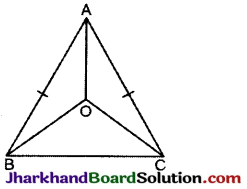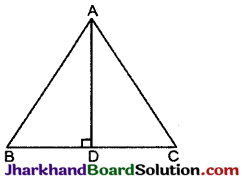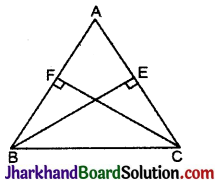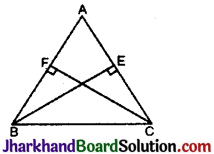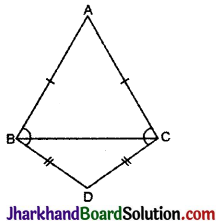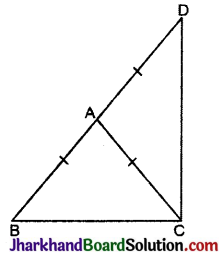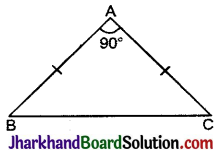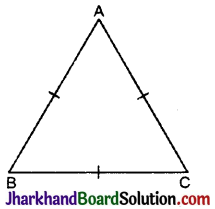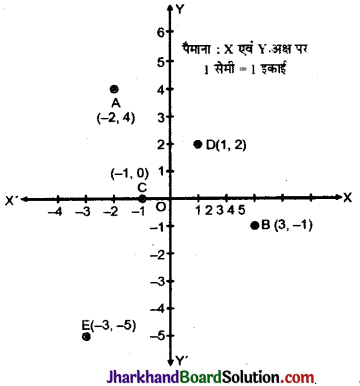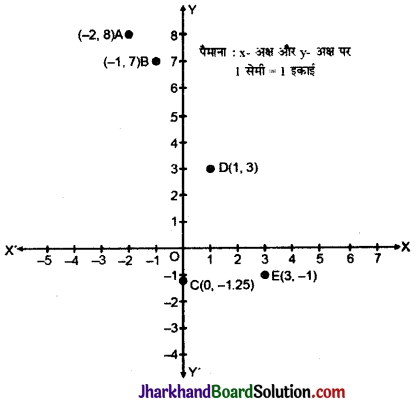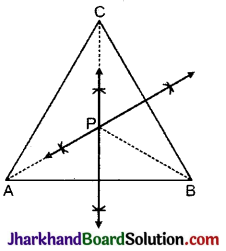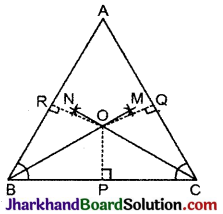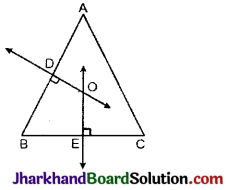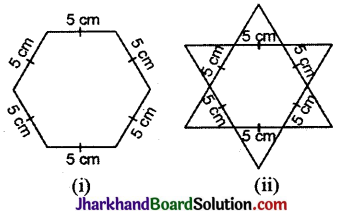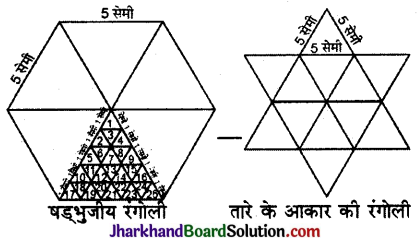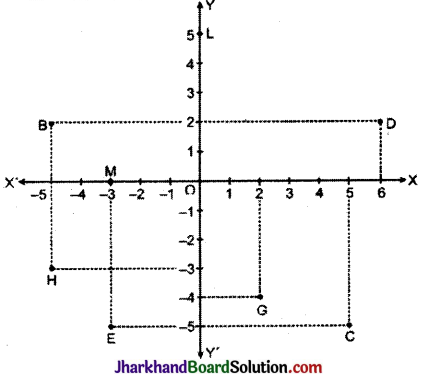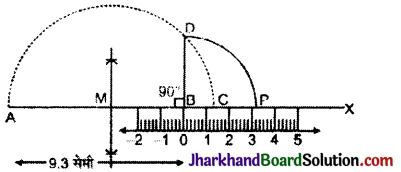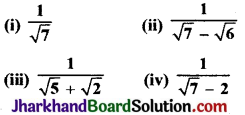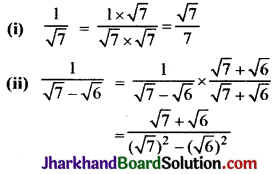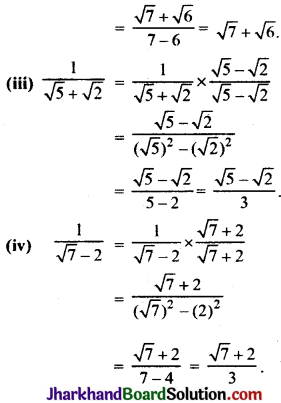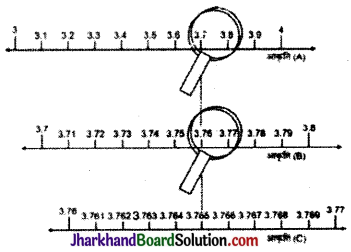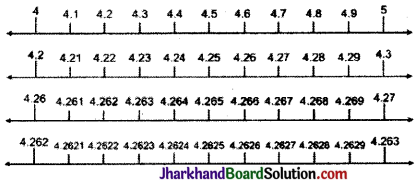Jharkhand Board JAC Class 9 English Solutions Moments Chapter 9 The Accidental Tourist Textbook Exercise Questions and Answers.
JAC Board Class 9 English Solutions Moments Chapter 9 The Accidental Tourist
JAC Class 9 English The Accidental Tourist Textbook Questions and Answers
Think About it
Question 1.
Bill Bryson says, “I am in short, easily confused.” What examples has he given to justify this ?
बिल ब्रायसन कहता है, “मैं, संक्षेप में आसानी से घबरा ( भ्रमित हो) जाता हूँ ।” इस कथन को न्यायसंगत ठहराने के लिए वह क्या उदाहरण देता है ?
Answer:
Bill Bryson gives a few examples to justify this statement. Many times while searching a lavatory in a cinema, he ends up in an alley standing on the wrong side of a self-locking door. He goes to the hotel desk (reception) at least two or three times a day to enquire about his room number that he forgets.
बिल ब्रायसन इस कथन की पुष्टि के लिए कुछ उदाहरण देता है । कई बार सिनेमा में शौचालय को ढूँढ़ते हुए वह तंग गली में स्वतः बन्द होने वाले दरवाजे पर गलत स्थान पर खड़ा हो जाता है । वह होटल में दिन में डेस्क पर ( रिसेप्शन पर ) दो या तीन बार अपने कमरे का नम्बर पूछने जाता है जिसे वह भूल जाता है ।
![]()
Question 2.
What happens when the zip on his carry-on bag gives way?
जब उसके स्वयं उठाने वाले बैग की जिप खुल (टूट) जाती है तब क्या होता है ?
Answer:
When the zip of his carry-on bag gives way, everything kept in it such as newspaper cuttings, magazines, passport, films, His tobacco tin, English coins, etc. spill out over an’ area of about the size of a tennis court.
‘जब उसके स्वयं उठाने वाले बैग की जिप खुल (टूट) जाती :- है तो इसमें रखी प्रत्येक वस्तु – अख़बारों की कतरनें, पत्रिकाएँ, पासपोर्ट, फिल्म्ज़, तम्बाकू की डिब्बी, अंग्रेजी सिक्के आदि टेनिस कोर्ट के क्षेत्र के बराबर क्षेत्र में बिखर जाते हैं ।
Question 3.
Why is his finger bleeding ? What is his wife’s reaction ?
उसकी उँगली से खून क्यों बह रहा है ? उसकी पत्नी की क्या प्रतिक्रिया है ?
Answer:
The zip of his carry-on bag gets jammed. He tries to open it and gets a long deep cut in his finger. It starts bleeding. His wife looks at him in wonder, not in anger
उसके स्वयं उठाने वाले बैग की जिप अटक जाती है । वह उसे खोलने की कोशिश करता है और उसकी उँगली में गहरा घाव हो जाता है । उँगली से खून बहने लगता है । तब उसकी पत्नी उसकी तरफ आश्चर्य से देखती है, न कि गुस्से में|
Question 4.
How does Bill Bryson end up in a ‘crash position’ in the aircraft ?
बिल ब्रायसन किस प्रकार हवाई जहाज में धराशायी होने की स्थिति में आता है ?
Answer:
Once while sitting in an aircraft, he bends to tie his shoelace. Just then the person sitting ahead of him throws his seat back into full recline and he ends up in crash position.
एक बार वह हवाई जहाज में बैठा हुआ अपने जूतों का फ़ीता बाँधने के लिए झुकता है । ठीक उसी समय उसके आगे वाला व्यक्ति अपनी सीट को पूरी तरह से पीछे झुका लेता है और वह धराशायी होने की स्थिति में आ जाता है ।
Question 5.
Why to his teeth and gums look navy blue?
उसके दाँत और मसूड़े गहरे नीले रंग के क्यों लगते हैं ?
Answer:
Once the author was writing down his important thoughts in a notebook. He started sucking one end of his pen while thinking. The ink leaked out and his teeth and gums became navy blue.
एक बार लेखक अपनी नोटबुक में अपने महत्त्वपूर्ण विचार नोट कर रहा था । वह सोचते-सोचते अपने पेन के एक सिरे को चूसने लगा। स्याही लीक कर गयी और उसके दाँत और मसूड़े गहरे नीले रंग के हो गये।
![]()
Question 6.
Bill Bryson ‘ached to be suave.’ Is he successful in his mission ? List his ‘unsuave’ ways.
बिल ब्रायसन ‘विनीत होने के लिए तड़पता था ।’ क्या वह अपने उद्देश्य में सफल हो पाया ? उसके अविनीत तरीकों की सूची बनाइये ।
Answer:
Bill Bryson longed to behave politely. He tried hard to be suave but could never be successful. He used to rise up from the dinner table as if he had experienced a localized earthquake. He got into the car and closed the door, leaving fourteen inches of coat outside. Whenever he wore light-coloured trousers, he spoiled them with ice cream, cough syrup and motor oil. Even on the air flights he could not drink or eat anything without spoiling his own or others’ clothes.
बिल ब्रायसन विनीत होने के लिए तड़पता था । उसने विनीत होने की काफी कोशिश की लेकिन वह कभी भी सफल न हो सका । वह खाने की मेज से इस प्रकार उठता था जैसे कि वहाँ भूकम्प आ गया हो । वह कार में बैठता और चौदह इंच का कोट बाहर छोड़े बिना दरवाजा बंद नहीं करता। जब कभी वह हल्के रंग का पायजामा पहनता तो उसे वह आइसक्रीम, खाँसी की दवा और मोटर ऑयल से गंदा कर । यहाँ तक कि हवाई उड़ान में भी वह अपने या दूसरों के कपड़े गन्दे किये बिना कुछ भी खा-पी नहीं सकता था।
Question 7.
Why do you think Bill Bryson’s wife says to the children, “Take the lids off the food for Daddy” ?
आपके विचार में बिल ब्रायसन की पत्नी अपने बच्चों से क्यों कहती है, “ अपने पिता के लिए खाने के ऊपर से ढक्कन हटाओ ” ?.
Answer:
It seems that Bill’s wife knew well the ways of her husband. She tells her children to take the lids off the food for Daddy, because she is almost sure that if her husband takes off the lids himself, he will spoil his own clothes and of those who are sitting near him.
ऐसा लगता है कि उसकी पत्नी अपने पति के रंग-ढंग को भली-भाँति जानती थी । वह अपने बच्चों को पिता के लिए खाने के ऊपर से ढक्कन हटाने के लिए इसलिए कहती है क्योंकि वह जानती है कि अगर वह स्वयं ढक्कन खोलेगा तो अपने और अपने पास बैठे हुए लोगों के कपड़े जरूर खराब कर देगा ।
Question 8.
What is the significance of the title ?
(इस कहानी के) शीर्षक का क्या महत्व (औचित्य) है ?
Answer:
Accidental means ‘happening something wrong by chance’. The author often goes on tours and trips. The story is full of mishappenings in the life of the author while he is travelling. He relates his experiences in a humorous style. We see that the whole story is filled with accidental happenings which is the significance of the title.
दुर्घटनापूर्ण का अर्थ है ‘किसी बुरी चीज का अचानक घटित होना ।’ लेखक अक्सर यात्रा पर जाता है । कहानी इस प्रकार की दुर्घटनाओं से भरी है जो लेखक के जीवन में उसकी यात्रा के दौरान अचानक घटती हैं। वह अपने अनुभवों को हास्यास्पद शैली में व्यक्त करता है । हम देखते हैं कि पूरी कहानी अचानक होने वाली दुर्घटनाओं से भरी है और यही शीर्षक का महत्व ( औचित्य ) है ।
Talk About it
Question 1.
To get confused and behave in ‘unsuave’ ways like Bill Bryson is normal and human. Tell your class about any similar situation that you found yourself in.
घबरा जाना और अविनीत व्यवहार करना जैसा बिल ब्रायसन करता है, सामान्य और मानवीय व्यवहार है । अपनी कक्षा को इससे मिलती-जुलती परिस्थिति के बारे में बताइये जो आपके साथ स्वयं घटी हो ।
Answer:
Once I was travelling in a bus. The ticket – checker asked me to show my ticket. I remembered that I had put it in the bag along with my wallet. I started searching for it frantically in the bag. I emptied the bag in my lap but the ticket was nowhere to be found. I felt embarrassed. The ticket checker was looking suspiciously at me. I said, “Sorry, I couldn’t find it but I did buy one.” “All right, buy another now,” he ordered. Reluctantly. I took out my wallet and opened it. To my surprise, the ticket was there. In fact, I had put it with the balance money in my wallet.
एक बार मैं बस में यात्रा कर रहा था । टिकिट चैकर ने मुझसे अपना टिकिट दिखाने को कहा । मुझे याद था कि मैंने इसे बैग में अपने बटुए (पर्स) के साथ रखा है । मैंने बड़ी बैचेनी के साथ टिकिट को बैग में खोजना शुरू किया । मैंने अपने बैग को अपनी गोद में खाली किया लेकिन टिकिट कहीं भी नहीं मिला । मैं बहुत शर्मिंदा । टिकिट – चैकर संदेह से मुझे घूर रहा था। मैंने कहा, “मुझे खेद है, मुझे यह (टिकिट) नहीं मिल सकी परन्तु मैंने खरीदी जरूर थी ।” “ठीक है, अब दूसरी खरीद लो,” उसने बड़ी बेरुखी से कहा । मैंने अपना बटुआ निकाला और उसे खोला । वाह ! मेरी टिकिट उसमें ही थी । वस्तुतः इसे मैंने बाकी बचे पैसों के साथ बटुए में ही रख दिया था ।
JAC Class 9 English The Accidental Tourist Important Questions and Answers
Answer the following questions in about 30 words each:
निम्नलिखित प्रत्येक प्रश्न का उत्तर लगभग 30 शब्दों में दीजिए :
Question 1.
What happened when the author was checking in at the Logan Airport in Boston?
जब लेखक बोस्टन में लोगान हवाई अड्डे पर प्रवेश कर रहा था तो क्या घटित हुआ ?
Answer:
His card was in the carry-on bag, but its zip was jammed. He pulled at it. It opened with a jerk, and the contents in the carry-on bag ejected all over.
उसका कार्ड साथ ले जाने वाले बैग (कैरी – आन बैग) में था, लेकिन इसकी जिप अटक गयी थी । उसने इसको खींचा । जिप एक झटके से खुल गई और बैग का सामान चारों ओर बिखर गया ।
![]()
Question 2.
How did the author injure his finger ? What happened thereafter ?
लेखक की उँगली कैसे घायल हुई ? उसके बाद क्या घटित हुआ ?
Answer:
The author tried to open the zip of his carry-on bag. But its zip was jammed. He pulled at it hard. His finger got injured and a lot of blood started flowing.
लेखक ने साथ लें जाने वाले बैग की जिप खोलने की कोशिश की । लेकिन वह अटक गयी थी । उसने इसे जोर से खींचा । उसकी उँगली घायल हो गयी और काफी खून बहने लगा था ।
Question 3.
Why did the author cry “My finger ! My finger!” ?
लेखक ” मेरी उँगली ! मेरी उँगली !” कहकर क्यों चिल्लाया ?
Answer:
The author was pulling the jammed zip of his bag with all his might. In this effort, his finger got a cut. So, he cried, “My finger ! My finger.”
लेखक अपने बैग की अटकी एक जिप को पूरी ताकत लगाकर खींच रहा था । इस प्रयास में उसकी उँगली कट गयी। इसलिए वह चिल्लाया ” मेरी उँगली ! मेरी उँगली ! ”
Question 4.
Why does the author not get his air miles ?
लेखक को अपने एयर माइल्ज़ क्यों प्राप्त नहीं हो पाते हैं ?
Answer:
The author doesn’t get his air miles because either he forgets to ask for them or the airline can’t record them. Sometimes, he is informed that he is not entitled to them.
लेखक को अपने एयर माइल्ज प्राप्त नहीं हो पाते हैं क्योंकि या तो वह उनके लिए पूछना भूल जाता है या एयर लाइन उनका रिकार्ड नहीं रख पाती है । कभी-कभी उसे बताया जाता है कि वह उनका हकदार नहीं है।
Question 5.
How did the lady react to the author when she was drenched twice with a soft drink by the author? उस महिला ने लेखक के प्रति कैसी प्रतिक्रिया की जब उसे लेखक द्वारा सॉफ्ट ड्रिंक से दो बार भिगो दिया गया था ?
Answer:
The author knocked a soft drink twice on a lady who was sitting beside him. She gave him a stupefied expression. She uttered some foul words for him. He had never heard these words earlier in public.
लेखक ने अपने बराबर में बैठी हुई महिला पर दो बार सॉफ्ट ड्रिंक गिरा दिया । उस महिला ने लेखक को ..ऐसे स्तब्धकारी भाव से ( इतने गुस्से से ) देखा कि उसके होश उड़ गये । उसने लेखक के लिए कुछ अपशब्द कहे । लेखक ने ये शब्द पहले कभी सबके सामने बोले जाते हुए नहीं सुने थे ।
![]()
Question 6.
How did the author fly differently after his confused ‘accidents’ ?
लेखक अपनी भ्रमित कर देने वाली दुर्घटनाओं के बाद अलग प्रकार से कैसे उड़ता था ?
Answer:
The author always mistakenly caused inconvenience to his fellow-travellers in the aeroplane. So, later he started flying without eating, drinking or leaning over to tie his shoelace. He just sat quietly. This was to save himself from any trouble.
लेखक अपनी हवाई यात्राओं के दौरान हमेशा गलती से अपने सहयात्रियों की असुविधा का कारण बन जाता था । इसलिए बाद में उसने बिना कुछ खाये – पिये या बिना (नीचे झुके अपने जूतों के फ़ीते बाँधने के लिए) यात्रा करना शुरू कर दिया । वह बस चुपचाप बैठा रहता था । वह ऐसा स्वयं को किसी भी परेशानी से बचाने के लिए करता था ।
Question 7.
What hope did the author have when he flew to Australia ? What happened then ?
जब लेखक ऑस्ट्रेलिया के लिए हवाई जहाज से गया तो उसे क्या आशा थी ? और तब क्या घटित हुआ?
Answer:
The author hoped that he would get a zillion air miles while flying to Australia. So, he presented his card to the Airlines’ clerk. But she informed him that he was not entitled because there was a difference in his names written over the ticket and on the card.
को आशा थी कि वह ऑस्ट्रेलिया के लिए उड़ते वक्त बहुत बड़ी संख्या में एअर माइल्ज प्राप्त करेगा । अतः उसने अपना कार्ड एयर लाइन्स की क्लर्क के सामने प्रस्तुत किया । लेकिन उसने उसे (लेखक को ) सूचित किया कि वह उनका अधिकारी नहीं था क्योंकि उसके टिकिट और कार्ड पर लिखे नामों में अन्तर था ।
Question 8.
What was the author’s worst experience on a flight ?
हवाई यात्रा के दौरान लेखक का सबसे खराब अनुभव क्या था ?
Answer:
The author’s worst experience was when he was writing some important thoughts in his notebook. He started talking with a young lady sitting next to him. He was sucking thoughtfully on the end of his pen in his mouth. The ink had leaked and his mouth, teeth, chin, tongue and gums were now a striking navy blue.
लेखक का सबसे खराब अनुभव वह था जब वह अपनी नोटबुक में कुछ महत्वपूर्ण विचार लिख रहा था और तभी उसने अपने बराबर में बैठी एक नवयुवती से बातें करना प्रारम्भ कर दिया । वह अपने पेन के एक सिरे को मुँह में डाल कर चूस रहा था। पेन लीक कर गया और उसका मुँह, दाँत, ठुड्डी, जीभ और मसूड़े गहरे नीले रंग के हो गये ।
Answer the following questions in about 60 words each:
निम्नलिखित प्रत्येक प्रश्न का उत्तर लगभग 60 शब्दों में दीजिए :
Question 1.
Describe the incident related to the opening of the zip of the carry-on bag by the author.
लेखक के कैरी-ऑन बैग की जिप खुलने की घटना का वर्णन कीजिए ।
Answer:
Note: इस प्रश्न के उत्तर के लिए Text Book के प्रश्न नं. 2 का उत्तर पढ़िये ।
Question 2.
How did the author come in a crash position? What happened when he knocked a softdrink on to the lap of a lady ?
लेखक धराशायी होने की स्थिति में कैसे आया ? जब उसने एक महिला की गोंद में सॉफ्ट ड्रिंक उड़ेल दिया तो क्या हुआ ?
Answer:
Once the author was flying in an aeroplane. He pushed his seat back in full recline bent over to tie his shoelace. But at the same time someone in the seat in front of him pushed his seat back. He fell down and was pinned to the floor in a crash position. On another occasion, he knocked a soft drink twice onto the lap of a sweet lady who was sitting beside him. The author was helpless but that lady gave him a mouthful of choicest abuse.
एक बार लेखक हवाई जहाज में उड़ रहा था । वह अपने जूते के फीते बाँधने के लिए नीचे झुका । परन्तु उसी समय उसके आगे वाली सीट पर बैठे व्यक्ति ने अपनी सीट को पीछे धकेला । वह गिर गया और गिरने की अवस्था में फर्श पर जा टिका। एक दूसरे अवसर पर, उसने एक प्यारी – सी महिला की गोद में दो बार सॉफ्ट ड्रिंक उड़ेल दिया जो उसके बराबर में बैठी हुई थी । लेखक असहाय था लेकिन उस महिला ने उसे मुँहभर कर चुनिंदा गालियाँ दी।
![]()
Question 3.
What was the author’s ‘worst experience on a flight’ ?
हवाई यात्रा के दौरान लेखक का सबसे बुरा अनुभव क्या था ?
Answer:
On the flight the author was writing some important thoughts in a notebook. He was sucking the another end of his pen while writing. He then began conversing with an attractive young lady in the next seat. He talked to her for about twenty minutes and then he went to the lavatory after that. He saw that his pen had leaked and his mouth, chin, tongue, teeth and gums were now a striking navy blue. This was the author’s ‘worst experience’.
एक उड़ान के दौरान लेखक एक नोटबुक में कुछ महत्वपूर्ण विचार लिख रहा था । लिखते समय वह पेन के दूसरे सिरे को मुँह में चूस रहा था। वह फिर बगल की सीट पर बैठी एक सुन्दर युवा महिला से बातें करने लग गया। वह उसके साथ लगभग बीस मिनट तक बातें करता रहा । उसके बाद वह शौचालय गया । उसने देखा कि पेन लीक कर गया था । उसका मुँह, ठुड्डी, जीभ, दाँत और मसूड़े गहरे नीले रंग के हो गये थे । यह लेखक का सबसे बुरा अनुभव था ।
Question 4.
The author was a frequent flyer in aeroplanes. He stood to get benefit of flying with his membership with the British Airways flyer programme, but he couldn’t get the benefit. Why ?
लेखक अक्सर हवाई यात्राएँ करता रहता था । ब्रिटिश एयरवेज़ के फ़्लायर कार्यक्रम की सदस्यता लेने के बाद उसे उड़ान पर लाभ मिलना था, परन्तु उसे यह लाभ नहीं मिल पाया । क्यों ?
Answer:
The author was a frequent traveller in aeroplanes. He had become a member of the British Airways’ flyer programme. By it he stood to get the benefit of flying in first class to places like Bali. However, sometimes he would forget to ask the airline staff about it, sometimes the airlines could not record it, and once his name did not match on the ticket and the card. So the author could not avail the chances of any air travel benefit.
लेखक अक्सर हवाई यात्राएँ करता रहता था । वह ब्रिटिश एयरवेज़ के फ्लायर प्रोग्राम का सदस्य बन गया था । इसके द्वारा वह बाली.. जैसे स्थानों पर प्रथम श्रेणी में उड़ानें भरने के लाभ के योग्य था । परन्तु कभी वह एयरलाइन कर्मी से पूछना भूल जाता, कभी एयरलाइन इसका रिकार्ड नहीं रख पाती, और एक बार तो उसका नाम टिकट पर व कार्ड पर मेल नहीं खाया। इस प्रकार लेखक हवाई यात्रा के लाभ के अवसर प्राप्त नहीं कर सका।
Question 5.
Describe the author, Bill Bryson as an accidental tourist.
लेखक बिल ब्रायसन का दुर्घटनाओं के शिकार होने वाले यात्री के रूप में वर्णन कीजिए ।
Answer:
The author often had to fly to various places. He could never have a journey without an unpleasant incident. Once the zip of his bag jammed. He pulled it hard, it suddenly gave way and all things in the bag were scattered all around. Once he was pinned between two seats of the plane while flying. On another occasion, he knocked a soft drink twice onto the lap of a lady. His worst experience was one when he got his mouth stained with dark blue ink.
![]()
लेखक को विभिन्न स्थानों के लिए अक्सर हवाई यात्राएँ करनी पड़ती थीं । कभी ऐसा नहीं हुआ कि उसकी किसी यात्रा के दौरान कोई बुरी घटना न घटे । एक बार उसके बैग की जिप अटक गई । उसने इसे बहुत ज़ोर से खींचा। यह अचानक से खुल गई और बैग में रखी सारी चीजें चारों ओर बिखर गईं। एक बार वह हवाई जहाज की यात्रा के दौरान दो सीटों के बीच में दब गया । एक बार उसने एक महिला की गोद में दो बार सॉफ्ट ड्रिंक उड़ेल दिया । उसका सबसे खराब अनुभव वह रहा जब उसके मुँह पर गहरी नीली स्याही लग गई ।
The Accidental Tourist Summary and Translation in Hindi
About the Story
ऐसा कहा जाता है कि आज का संसार एक छोटा स्थान है क्योंकि यात्रा करना सरल हों गया है, लेकिन यात्रा करना हर किसी के लिए सरल नहीं होता । यहाँ ( इस कहानी में ) लेखक एक यात्री के रूप में हुए अपने अनुभवों पर विनोदपूर्ण ढंग से प्रकाश डाल रहा है ।
Word-Meanings And Hindi Translation
Of all the things ………….. trouble started. (Page 56)
Meanings: good at = कुशल, निपुण । outstanding (आउट्स्टैण्डिंग) = exceptionally good, विशिष्ट । perhaps (पॅ:हैप्स्) = शायद । constantly (कॉन्स्टेट्लि) = निरन्तर । wonder (वण्ड (र)) = surprise, आश्चर्य। evident (एविडण्ट) = clear, स्पष्ट । difficulty (डिफिकल्ट) = hardship, कठिनाई । pretty much beyond me (प्रिटि मच बियॉण्ड मी) = बिल्कुल मेरी पहुँच के बाहर । looking for (लुकिंग फॉ(र)) = searching, ढूँढना। lavatory (लैवॅटॅरि) = toilet, शौचालय । instance (इन्स्टन्स) example, उदाहरण | alley (ऐलि) = lane, गली। self-locking (सेल्फलॉकिंग) = स्वचालित रूप से बन्द होने वाला । particular (पॅ: टिक्युलर) specialty (स्पेश्यल्टि) = special quality, विशेषता । returning ( रिट:निंग) = going back, वापिस लौटना |
in short (इन शॉन) = संक्षेप में । confused (कनफ्यूज़्ड) = चकरा जाने वाला, भ्रमित |= खास। famille (एन फैमिली) = with family, परिवार सहित । trip (ट्रिप) = journey यात्रा । checking in (ph.v) (चेकिंग इन) = हवाई अड्डे पर पहुँचकर संबद्ध अधिकारी को अपने आगमन की सूचना देना | suddenly (सडन्लि) = अचानक remembered (रिमेम्बर्ड) = came to mind, याद आया । recently (रीस्ट्ल) = a short while back, कुछ ही समय पहले, हाल ही में । joined (जॉइण्ड) = took part, भाग लिया । frequent ( फ्रीक्वण्ट) = very often, बहुधा । flyer ( फ्लाइॲ (र)) = one who travels by air route, उड़ने वाला, हवाई यात्रा करने वाला । hanging (हैंगिंग) = लटका हुआ । trouble (टूब्लू) परेशानी, गड़बड़ी ।
हिन्दी अनुवाद उन सब चीजों में जिनमें मैं बहुत अच्छा नहीं हूँ शायद सबसे विशिष्ट है- वास्तविक संसार में रहना । मुझे निरंतर कई बातों पर आश्चर्य होता है कि लोग बिना किसी स्पष्ट कठिनाई के कितने काम कर लेते हैं जो मेरी पहुँच के बिल्कुल बाहर होते हैं । उदाहरण के लिए, मैं आपको बता नहीं सकता कि कितनी बार मैं किसी सिनेमा में शौचालय ढूँढ़ने गया हूँ और स्वयं को गली में एक स्वचालित रूप से बन्द होने वाले दरवाज़े के गलत ओर खड़ा पाया है । अब मेरी खास विशेषता यह है कि दिन में दो-तीन बार होटल के स्वागत काउण्टर ( रिसेप्शन ) पर वापिस लौटकर जाना और यह पूछना कि मेरे कमरे का नम्बर क्या है ।
संक्षेप में, मैं बहुत आसानी से चकरा जाता हूँ । मैं इसके बारे में सोच रहा था । जब हम पिछली बार परिवार सहित एक लम्बी यात्रा पर गये थे। ईस्टर ( ईसाइयों का एक त्योहार) का समय था और हम एक सप्ताह के लिए इंग्लैण्ड जा रहे थे । जब हम बोस्टन में लोगन हवाई अड्डे पर पहुँचे, और हवाई अड्डे पर पहुँचकर संबद्ध अधिकारी को अपने आगमन की सूचना दे रहे थे या जब हमारी जाँच चल रही थी तभी अचानक मुझे याद आया कि हाल ही में मैंने ब्रिटिश एयरवेज़ के बहुधा (अक्सर ) उड़ान भरने वाले यात्रियों के लिए कार्यक्रम में भाग लिया है । मुझे यह भी याद आया कि मैंने सम्बन्धित कार्ड अपनी गर्दन में लटके हुए कैरी-ऑन बैग में रखा था । और यहीं से गड़बड़ी शुरू हुई।
![]()
The zip on the bag ……………. as it went.(Pages 56-57)
Meanings: jammed (जैम्ड) = got stuck, अटक गई, जाम हो गई । pulled ( पुल्ड) = : खींचा। yanked (यैन्क्ट) = put pressure with a jerk, झटके से ज़ोर लगाया । grunts (ग्रण्ट्स) = short low sound at the throat, घुरघुराने की आवाज़ । frowns (फ्राउन्ज़) = knitting the brows showing displeasure, गुस्से में त्योरियाँ चढ़ाना । increasing (इनक्रीजिंग) = growing, बढ़ते हुए । consternation (कॉन्स्टॅ: नेशन) = worry or annoyance, चिन्ता या क्रोध । kept this up ( केप्ट दिस अप) = continued this, यह करना जारी रखा। budge (बज) = move slightly, जरा-सा हिला । harder and harder (हाड (र) एण्ड हाड (र)) और अधिक ज़ोर से । अनुमान लगाना । happened (हैपण्ड ) guess (गेस) took place, घटित हुआ । abruptly (एब्रप्टलि) suddenly, अचानक | gave way (गेव वे) = opened, खुल गई । extravagantly (इक्स्ट्रैवगट्लि) = खुलकर, बहुत बड़ी मात्रा में ।
ejected (इजेक्टिड) = came out, बाहर आ गया ।= thewatched (वॉच्ट) = saw, देखा । dumbstruck (डमस्ट्रक) = speechless अवाक्, मानो जुबान पर ताला लग गया हो । carefully (केयरफलि) with great attention, ध्यान से, सावधानीपूर्वक | sorted (सॉटिड) arranged into classes, अलग-अलग छाँटकर व्यवस्थित किये गये । documents (डॉक्युमण्ट्स) = important papers, दस्तावेज़, ( कागजात ) | fluttery ( फ़्लटरि ) that falls with a light irregular motion, हल्के से अनियमित गति से गिरने वाला ।
cascade (कैस्केड़) = waterfall, झरना । coins (कॉइन्ज़ ) = सिक्के | bounced (बाउन्स्ड) = उछले । a variety of (अ वेराइटि ऑव ) = of different types, अलग-अलग प्रकार की । oblivions (अब्लिविअन्ज़) विस्मृतियाँ । lidless (लिडलेस) = whose lid was removed, जिसका ढक्कन खुल गया था । rolled (रॉल्ड) = लुढ़का । crazily (क्रेज़िलि ) = very fast, बहुत तेज़ी से । concourse (कॉकॉस्) open central area at airport, हवाई अड्डे का बीच का खुला हुआ भाग । disgorging ( डिरगॉ: जिंग) discharging, बाहर निकालते हुए, बिखेरते हुए | contents (कॉन्टेन्ट्स) = अन्दर की वस्तुएँ, सामग्री ।
हिन्दी अनुवाद – बैग की जिप जाम हो गई थी । इसलिए मैंने इसे खींचा और इस पर घुरघुराहट की आवाज और गुस्से के साथ झटके से ज़ोर लगाया और मेरी चिन्ता ( परेशानी) बढ़ती जा रही थी । मैं कुछ मिनट तक ऐसा करता रहा परन्तु जिप हिली भी नहीं, इसलिए मैंने घुरघुराते हुए उसे और ज़ोर से खींचा । हाँ, आप अनुमान लगा सकते हैं कि क्या हुआ होगा ।
अचानक जिप टूट गई। बैग का उस ओर का ढक्कन हटकर खुल गया और अन्दर रखी हुई प्रत्येक वस्तु – अखबारों की कतरनें, और अन्य खुले कागज़, पाइप में भरने वाले तम्बाकू का एक चौदह आउन्स का डिब्बा, मैगज़ीन्स, पासपोर्ट, इंग्लैण्ड की मुद्रा में धन, फिल्म बहुत बड़ी मात्रा में बाहर आकर एक टेनिस कोर्ट जितने बड़ेआकार के क्षेत्र में फैल गई । पता लगा ।
मैं अवाक् खड़ा देखता रहा जबकि सावधानीपूर्वक छाँटकर व्यवस्थित किये गये बहुत-से दस्तावेज़ एक हल्की आवाज़ के साथ अनियमित गति से गिरने वाले झरने की भाँति बरसते हुए से बाहर आये, सिक्के भूल-चूक से अनेक प्रकार की आवाज़ें करते हुए उछल रहे थे और अब जिसका ढक्कन खुल चुका था ऐसा तम्बाकू का डिब्बा हवाई अड्डे के बीच के खुले भाग में तेज़ी से लुढ़क रहा था और लुढ़कते समय उसमें रखी हुई सामग्री बिखरती जा रही थी ।
![]()
“My tobacco!” ……………. for a living.” (Page 57)
Meanings : horror (हॉर (रॅ)) fear, डर । discovered (डिस्कवॅ: ड्) = found out, gashed.(गैश्ट) = cut, कट गई । shedding (शेंडिंग) = flowing, बह रहा । in a lavish manner (इन अ लैविश मैन (र)) = प्रचुरता से; अत्यधिक । good around (गुड अराउण्ड) unalarmed by,, (यहाँ) सहज रहना । flowing (फ़्लोइंग.) बहना । generally (जेनरलि) = सामान्यतः । hysterics ( हिस्टिरिक्स) = crying loudly with great fear, बहुत अधिक डर से चीखना, चिल्लाना । justified (जस्टिफाइड) = correct, उचित, न्यायसंगत ।
confused (कनफ्यूज्ड) = unable to decide what to do, भ्रमित । unable (अनेब्ल ) = असमर्थ | help (हेल्प) = doing something, कुछ करना । panic (पैनिक) = too much fear, बहुत अधिक डर । mode (मोड) = way, तरीका। point (पॉइण्ट ) = moment, situation, पल, स्थिति । expression ( इक्स्प्रेशन् ) अभिव्यक्ति, भाव wonder (वण्ड (र)) = surprise, आश्चर्य । exasperation (इग्ज़ैस्परेशन) = irritation, चिड़चिड़ापन ।
हिन्दी अनुवाद – अब जबकि ( इंग्लैंड में) एक नया बजट भी आकर चला गया है अर्थात् लागू हो गया है, ऐसे में मुझे इंग्लैण्ड में इतना तम्बाकू कितने पैसे में मिलेगा मैं यह सोचकर डर से चिल्लाया ” मेरा तम्बाकू !” और फिर मेरी चीख ” मेरी उँगली ! मेरी उँगली !” में बदल गई क्योंकि मैंने यह पाया कि मेरी उँगली जिप से कट गई थी और इससे बहुत अधिक खून बह रहा था ।
( सामान्यतः मैं खून बहने असहज नहीं होता हूँ, पर जब मेरे अपने खून की बात हो तो, हाँ, भय से चीखना – चिल्लाना पूरी तरह उचित है ।) मैं भ्रमित था और कुछ करने में असमर्थ था, ऐसे में मेरे बाल अत्यधिक भय के कारण खड़े हो गये । इस पल मेरी पत्नी ने मुझे आश्चर्य के भाव से देखा – गुस्से या चिड़चिड़ेपन से नहीं, लेकिन बस सीधे-साधे आश्चर्य से देखा और कहा, “मुझे विश्वास नहीं होता कि तुम जीने के लिए यह सब करते हो ।”
But I’m afraid ………….. get myself freed. (Page 57 )
Meanings: afraid (अफ्रेड) = sorry, खेद है । so (सो) = like this, ऐसा। catastrophes (कटैस्ट्रॅफिज़ ) = very dangerous situations, बहुत खतरनाक स्थितियाँ, महाविपत्तियाँ | travel (ट्रैवल ) = यात्रा करना । leaned over (लीन्ड ओव(र)) = stooped, झुका । tie (टाइ) = बाँधना। shoelace (शू – लेस) = जूते का फीता । just at that moment ( जस्ट ऐट दैट मोमण्ट) ठीक उसी समय । ahead (अहेड) = सामने । recline (रिक्लाइन) = move the back of (a seat) into sloping position, झुकाव । pinned ( पिन्ड) (यहाँ) दबा हुआ । helplessly (हेल्पलेस्लि) = असहाय रूप से । crash position ( क्रैश पज़ीशन) clawing (क्लॉइंग) = scratching with nails, नोंचकर | managed to get myself freed = स्वयं को निकालने में सफल हुआ । कुचले जाने की स्थिति में ।
हिन्दी अनुवाद लेकिन मुझे खेद है कि ऐसा ही है। यात्रा के दौरान मेरे साथ हमेशा बहुत खतरनाक स्थितियाँ आ जाती हैं । एक बार एक हवाईजहाज में, मैं अपने जूते का फ़ीता बाँधने के लिए झुका, ठीक उसी समय मेरे सामने की सीट पर बैठे हुए व्यक्ति ने अपनी सीट को पूरा पीछे झुका लिया और मैं असहाय रूप से दबकर कुचले जाने की स्थिति में आ गया । अपने बराबर में बैठे हुए व्यक्ति की टाँग को नोंचकर ही मैं किसी तरह वहाँ से निकल सका।
On another occasion …………. by anun. (Page 58)
Meaning:occasion (ॲकेशन) = chance, अवसर | knocked (नॉक्ट) = poured with a jerk, झटके से उड़ेल दिया, टकरा दिया । lap (लैप) गोद । beside (बिसाइड) = बगल में, बराबर में । flight attendant (फ्लाइट् अटॅण्डॅण्ट) = बिमान परिचारिका । replacement ( रिप्लेसमेण्ट्) = बदले में दूसरा स्थानापन्न | instantly (इन्स्टॅण्ट्ल) = just at that moment, तत्काल, उसी पल । to this day (टु दिस डे) = till today, आज तक। reaching out’ (रीचिंग आउट) = हाथ बढ़ा रहा । helplessly (हेल्पलेस्लि ) = where I could do nothing, असहाय रूप से । cheap (चीप) = of poor quality, सस्ती, घटिया | prop (प्रॉप) = a piece of wood, metal etc. for support, टेक; सहारा | horror movies (हॉर (र) मूवीज़) = डरावनी फिल्में ।
violently (वॉयलट्लि) = with a great jerk, धड़ाम से । swept ( स्वेप्ट) = was spilled, गिरा | perch (पॅच) = stand, टिकने का स्थान, डण्डा । stupefied ( स्ट्यूपिफ़ाइड) depriving one of sensibility, जिससे किसी का होश खो जाये, हक्का-बक्का कर देने वाले । expression ( इक्स्प्रेशन) = भाव । expect (एक्स्पेक्ट) = आशा करना । receive ( रिसीव ) = get, प्राप्त करना | repeatedly (रिपीटिड्लि) = again and again, बार-बार | drenched (ड्रेन्ट) = made wet, भिगो दिया । uttered ( अटॅ: ड्) = said, कहा, मुँह से निकाला । oath (ओथ ) = (here) some. abusive words, दुर्वचन; अपशब्द, गाली |certainly (सॅटेन्लि) surely, निश्चित रूप से । nun (नऩ) = a religious woman, तपस्विनी, मठवासिनी ।
हिन्दी अनुवाद – एक और अवसर पर मैंने अपने बराबर में बैठी हुई एक प्यारी सी छोटी महिला की गोद में एक झटके से सॉफ्ट ड्रिंक उड़ेल दिया था । विमान परिचारिका आई और उसने उसको ( उस महिला को) साफ किया और मेरे लिए बदले में एक दूसरा ड्रिंक लाई और उसी पल मैंने इसे पुनः उस महिला पर उड़ेल दिया । मुझे आज तक यह समझ में नहीं आता है कि मुझसे ऐसा कैसे हुआ। मुझे बस इतना याद है कि मैंने नये ड्रिंक की ओर अपना हाथ बढ़ाया और 1950 के दशक की “The Undead Limb” जैसे नाम वाली किसी डरावनी फिल्म में सस्ती व घटिया टेक की भाँति ड्रिंक अपने टिकने के स्थान से धड़ाम से उसकी गोद में गिर पड़ा और मैं अपनी बाँह को असहाय रूप से देखता रह गया । उस स्त्री ने मुझे ऐसे हक्के-बक्के भाव से देखा कि मेरे होश उड़ गये, जिसको आपने बार-बार भिगो दिया हो उससे आप ऐसे ही भाव की आशा कर सकते हैं। उसने अपने मुँह से मेरे लिए कुछ अपशब्द कहे जिसका पहला शब्द ‘ओह’ था और आखिरी शब्द की खातिर’, और बीच में कुछ ऐसे शब्द थे जो मैंने पहले कभी सबके सामने बोले जाते हुए नहीं सुने थे, निश्चित रूप से एक मठवासिनी ( तपस्विनी) के द्वारा तो नहीं ।
![]()
This, however ………………. for several days. (Pages 58-59)
Meanings : however (हाउएव (र)) (एक्स्पीरिॲन्स्) (सकिंग) = चूसते हुए। thoughtfully (थॉट्फलि) = lost in thoughts, विचारमग्न होकर | end ( एण्ड ) = point, छोर, किनारा । fell into conversation ( फेल इनटु कॅन्वें: सेशन) = started talking, बातें करने लगा । attractive हालाँकि I worst (वॅस्ट्) सबसे खराब | experience अनुभव | thoughts (थॉट्स् ) = विचार | clutch ( क्लच) = hold, पकड़ना | sucking (अट्रैक्टिव) = charming, आकर्षक । amused (अम्यूज़्ड) = entertained, मन बहलाया । perhaps (पॅ: हैप्स) = possibly, शायद । scattering (स्कैटरिंग) = इधर-उधर की बातें । urbane (अॅ:बेन) = courteous and civilized, शिष्ट और सभ्य । bons mots (बॉन्ज़ मोट्स) = clever and funny remarks, मजेदार बातें । retired (रिटाइॲर्स्) = left for चला गया। lavatory (लॅवॅटरि) = toilet, शौचालय | discovered (डिस्कवर्ड) = found out, पता चला । striking (स्ट्राइकिंग) = unusual enough to draw attention, जिन पर सभी का ध्यान जाये । scrub-resistant (स्क्रब रिजिस्टण्ट ) = that may not go even after scrubbing, जो रगड़ने पर भी न छूटे । remain (रिमेन) = stay, बने रहना । several (सेवरल) कई ।
हिन्दी अनुवाद – हालाँकि, यह मेरा किसी हवाई यात्रा के दौरान रहा सबसे खराब अनुभव नहीं था । मेरा सबसे खराब अनुभव वह था जब मैं एक नोटबुक में महत्त्वपूर्ण विचारों को लिख रहा था (‘मोजे खरीदना’, ‘ड्रिंक्स को सावधानीपूर्वक पकड़ना’, इत्यादि), साथ ही मैं विचारमग्न होकर अपने पेन के छोर को चूस रहा था जैसा कि आप भी करते हैं, और मैं बगल वाली सीट पर बैठी एक आकर्षक नवयुवती से बातें करने लगा । मजेदार बातें करके शायद बीस मिनट तक मैंने उसका मनोरंजन किया, फिर मैं शौचालय चला गया जहाँ मुझे पता चला कि मेरा पेन लीक कर गया था और मेरा मुँह, ठुड्डी, जीभ, दाँत और मसूड़े सब ऐसे हो गये थे जिन पर सभी का ध्यान जाये अर्थात् वे इतने गहरे नीले हो गये थे कि रगड़ने पर भी साफ न हों और कई दिनों तक वे ऐसे ही रहने वाले थे ।
So you will ……………. is not to be. (Page 59)
Meanings: trust (ट्रस्ट) = believe, विश्वास करना । ache (एक्) = suffer, परेशानी उठाना | suave (स्वेव) sophisticated; polite, विनम्र । as if (ऐज़ इफ़) = जैसे कि । just (जस्ट) = बिल्कुल अभी । extremely (इक्स्ट्रीम्लि) = very much, अत्यधिक, बिल्कुल । localised (लोकलाइज़्ड) = to limit something to a particular place, स्थानीयकरण कर देना, उसी स्थान पर । seismic (सेस्मिक) = of earthquake, भूकम्प की । event (इवेण्ट) : incident, घटना । get in (गेट इन ) = सवार होना । various times (वेरियस टाइम्ज़) = many. times, बहुत बार ।
हिन्दी अनुवाद – इसलिए मुझे विश्वास है कि इसे आप तब समझेंगे जब मैं आपको बताऊँगा कि मैं विनम्र बनने के लिए कितना तड़पता हूँ। मैं चाहूँगा कि काश जीवन में बस एक बार मैं बिना ऐसा दिखे, भोजन की मेज से उठ खड़ा होऊँ, जैसे मानो कि मैंने बिल्कुल अभी ठीक उसी स्थान पर भूकम्पीय घटना का अनुभव किया है। एक कार में सवार होता हूँ और 14 इंच के कोट को छोड़े बिना उसके दरवाज़े को बन्द करता हूँ । और फिर जब मैं हल्के रंग का पायजामा पहनता हूँ तो दिन के अन्त तक मुझे यह पता नहीं चलता कि मैं बहुत बार च्यूइंग गम, आईसक्रीम, खाँसी के सिरप और मोटर ऑयल पर बैठ चुका हूँ । परन्तु ऐसा नहीं होना है अर्थात् ऐसा नहीं होना चाहिए ।
Now on planes ….. laundry bills.(Page 59)
Meanings : is delivered (इज़ डिलीवॅ : ड्) = is given दिया जाता है । lids (लिड्ज़) = ढक्कन । take the lids off (टेक द ‘लिड्ज़ ऑफ़ ) = remove the lids, ढक्कन हटाओ । hoods (हूड्ज़) = caps attached to dress, टोपियाँ । about to (अबाउट टु) = just going to start, होने वाले । of course ( ऑव कोर्स) = certainly, निश्चित ही । lean over ( लीन ओवॅ (र)) bend, झुकना । quietly (क्वाइट्ल) = peacefully, शान्तिपूर्वक । unexpectedly (अन्एक्स्पेक्टिड्लि) = without expecting, अप्रत्याशित रूप से अचानक ही । causing (कॉज़िंग) = doing करना । liquid (लिक्विड) = related to some drink, किसी पेय पदार्थ से सम्बन्धित | mischief (मिसचिफ ) = शरारत । at least ( ऐट लीस्ट) = कम से कम | cut down ( कट डाउन) = lessen, कम करना । laundry (लॉन्ड्रि) = washing of clothes, कपड़ों की धुलाई |
हिन्दी अनुवाद – अब हवाईजहाज में जब खाना दिया जाता है तो मेरी पत्नी कहती है, “ बच्चो ! डैडी के लिए भोजन के ढक्कन हटाओ” या ” बच्चो ! अपनी टोपियाँ चढ़ा लो । डैडी मांस काटने ही वाले हैं ।” वास्तव में, ऐसा केवल तभी होता है जब मैं अपने परिवार के साथ हवाई यात्रा पर होता हूँ । जब मैं अकेला होता हूँ तो मैं न खाता हूँ, न पीता हूँ, न अपने जूते के फीते बाँधने के लिए झुकता हूँ, और पेन को तो अपने मुँह के आसपास कभी नहीं रखता हूँ । मैं अत्यधिक शान्तिपूर्वक बैठा रहता हूँ और कभी-कभी तो अपने हाथों को रोककर बैठा रहता हूँ जिससे कि वे अप्रत्याशित रूप से उठकर कोई पेय पदार्थ सम्बन्धी शहास्त न कर दें (किसी पर पेय पदार्थ न गिरा दें) । इसमें बहुत मज़ा नहीं आता है परन्तु इससे कम से कम कपड़ों की धुलाई का खर्च तो कम होता है ।
I never did ………….. without eating. (Pages 59-60)
Meanings: frequent ( फ्रीक्वण्ट ) = very often, बहुधा । flyer ( फ्लाइॲ (र)) = one who travels by air, हवाई यात्री | flyer miles ( फ्लाइअ (र) माइल्ज्) = a kind of flyer scheme, एक प्रकार की हवाई यात्री स्कीम, फ्लायर माइल्ज । frustration ( फ्रस्ट्रेशन) = a matter of annoyance, कुण्ठा, निराशा, चिढ़ की बात । forever (फॉ(र) एव (र)) = always, हमेशा । collect (कलेक्ट) = gather, इक्ट्ठा करना । accumulated (एक्यूम्युलेटिड ) | = collected, इकट्ठे किये । divided ( डिवाइडिड ) = parted, विभाजित | either (ईदॅ (र)) = या तो । forget (फॅगेट) = भूल जाना | check in (चेक इन) = enter, प्रवेश करना | remember (रिमेम्बॅ (र)) = keep in mind, याद रखना। informs (इन्फॉम्ज़) = tells, बताता है । entitled (एनटाइटल्ड) having the right, हकदार, अधिकृत । a zillion ( ए ज़िल्यन ) = a very large number, बहुत बड़ी संख्या । shook ( शुक) = moved, हिलाया। presented (प्रेज़ेन्टिड) = showed दिखाया । explained (इक्स्प्लेन्ड ) = made clear, समझाया | close (क्लोज़) = near, घनिष्ठ । venerable (वेनरब्ल ) = worth respect, सम्मानित । relationship (रिलेशनशिप) = सम्बन्ध । that long ( दैट लाँग ) = इतना दूर ।
हिन्दी अनुवाद- प्रसंगवश, मुझे बहुधा अपने फ़्लायर माइल्ज़ कभी प्राप्त नहीं हुए। मुझे वे अब भी कभी प्राप्त नहीं होते हैं । मुझे समय पर कार्ड नहीं मिल पाता। यह मेरे लिए वास्तव में निराशा वाली बात हो गई है । मेरी जान-पहचान का प्रत्येक व्यक्ति हमेंशा अपने एयर माइल्ज़ का उपयोग करके प्रथम श्रेणी में बाली की हवाई यात्रा करता है । मैं कभी कुछ इकट्ठा नहीं कर पाता हूँ । मुझे वर्ष में 100,000 मील की हवाई यात्रा अवश्य करनी चाहिए फिर भी मैंने केवल लगभग 212 माइल्ज़ इकट्ठे किये हैं जो 23 एयरलाइन्स के बीच विभाजित हैं ।
![]()
ऐसा इसलिए है कि या तो मैं प्रवेश करते समय एयर माइल्ज़ के लिए पूछना भूल जाता हूँ या मैं उनके बारे में पूछना याद करता हैं किन्तु उस समय तक एयर लाइन उनका लेखा-जोखा नहीं रख पाती है या चेक-इन क्लर्क मुझे बताता है कि मैं उनका अधिकारी नहीं हूँ (मुझे वे नहीं मिल सकते ) । जनवरी में ऑस्ट्रेलिया के लिए एक ऐसी उड़ान पर जिसके लिए मुझे बहुत बड़ी संख्या में एयर माइल्ज़ मिलने वाले थे जब मैंने अपना कार्ड दिखाया तो क्लर्क ने अपना सिर हिलाया और कहा कि मुझे कोई एयर माइल्ज़ नहीं मिल सकते थे। मैंने पूछा, “क्यों ?” क्लर्क बोली ” टिकिट बी. ब्रायसन के नाम से है और कार्ड डब्ल्यू. ब्रायसन के नाम पर है । ” मैंने उसे बिल (बी.) और विलियम (डब्ल्यू.) के बीच का घनिष्ठ व सम्मानित ( सबके द्वारा स्वीकृत) सम्बन्ध समझाया किन्तु उसने इसे स्वीकार नहीं किया । इसलिए मुझे मेरे एयर माइल्ज़ नहीं मिले, और मैं अभी प्रथम श्रेणी में बाली की यात्रा नहीं कर पाऊँगा । शायद, वास्तव में, यह अच्छा ही है । मैं बिना खाये इतनी लम्बी यात्रा कभी नहीं कर सकता ।
